#like...multiple points where the 'invisible hand of the universe' got a lot more visible
Text
Nice to see this place hasn't changed a bit since I was gone 🫠
#seriously though it's kind of impressive#and hilarious but also comforting#also hello! I am back! time to dust the cobwebs off this pen name i think#as for where I've been for the last two years...it's a very very very long story and a lot lot lot has happened#some of it good--some of it very good!--but most of it was extremely enraging and depressing#but all of it was important#even the bad parts#lot of IRL character development to be had#but I have overcome!! And my life is unbelievably better for it now#(and my writing is better for it too 👀)#I'm kinda tempted to make a whole-ass post about exactly what went down but I'm also wondering if maybe I shouldn't#partly cuz I don't want to air dirty laundry on the internet but also cuz my therapist cried at some parts so uuuhhh yeah maybe I shouldn't#but I still wanna post at least the good parts because they were seriously INSANELY improbable!!#like...multiple points where the 'invisible hand of the universe' got a lot more visible#so ultimately I'm happier than ever now#I just wish my dog could see it too#but sometimes the hardest choices to live with are the choices other people make for you#but hey! neither of us are hurting anymore. both of us have overcome :)#personal#me#tumblr
0 notes
Text
May 9: Roadside Picnic + Red’s Strength
My mom and I had a long video talk tonight, in which we talked about Roadside Picnic, among other things. She pointed out to me that the mystery object in ch2 was the slime!! Of course it was the slime! I did not put that together at all. I sorta started to because I did connect that moment to the conversation in chapter 1 about the slime and the people who wanted it, but I took the more general point that they wanted bad stuff from the Zone, not the specific point about the slime, even though Noonan later tells the story of the lab accident with the slime, and that is the specific object that Red said he wouldn’t take from the Zone, and then he did. Agh! I feel so dumb!!
Close but no cigar lmao.
Anyway, I also shared my theory that Red might be physically changed as well as mentally changed by his time in the Zone.
Most of my evidence is pretty circumstantial but I do think there’s one significant piece of evidence.
First, there’s the moment outside the hotel in chapter two where he seems to see the world differently, where his very senses are changing. I wondered if this was perhaps him being able to see as the aliens see? Gaining new abilities from his interactions with their objects? This fits in with the doctor saying that perhaps the Monkey isn’t human and the other indications that she might be like the aliens--she got that way because of Red.
Second, there’s a line, I think in the conversation between Noonan and the General, where one of them talks about what happens to the stalkers, and their children. It’s a very ambiguous reference, but I noticed it because of how it seems to separate out what happens to the stalkers versus what happens to their children. Yet connecting the effects of the Zone on the stalkers to the effects of the Zone on their offspring also makes it seem like the effect on the stalkers is physical. Because at this point we know what a stalker child looks like, and we know that time in the Zone has mental consequences: the rampant alcoholism, for example. There are physical dangers up to and including death. But we haven’t heard anything akin to the kind of natural deformities we know occur in stalker children, so this seems like a different type of Zone after-effect. So that to me planted the idea of some physical change over time, visible to the naked eye, among long term stalkers. I also thought this might be what so scared Noonan about approaching the Schuharts’ home. Obviously, that turned out to be his fear of the returned Schuhart Sr. but because it had been a couple years, in universe, since we’d last seen Red, I thought maybe the Red we saw would be transformed in some way.
Third, and mos importantly, there’s the story of how he kicked out the people who came to take his father away for experiments. The story might have become a bit exaggerated in the telling, but the bare facts of it are that something like 4-5 people, including a couple big, brawny orderlies, came to take Red’s father away, and all of them ended up on their asses in the street. He got rid of all of them without being overpowered, somehow, and still had enough energy to break the windows of their car. Like, that’s not normal. That’s not even on the upper end of human strength.
I would also point out that he does a lot of pretty impressive feats in the Zone: multiple instances of dragging people and objects out while crawling on his hands and knees, for example. This could be explained by reference just to his experience and his pure determination. Still a little suspicious though.
Also, we know very little about what Red looks like, really only that he has red hair and freckles. His body type is never described, nor are any changes in it. Like, even a muscly 6′5′‘ giant couldn’t do what Red does when his father is threatened but my point is that if he is getting noticeably taller or stronger, or changing in body shape, no one mentions it one way or the other. The strength could also be invisible, but still the sort of thing that people have noticed in stalkers over time.
Oooh also just occurred to me--the Vulture was called the Strongman before he got his later nickname. Is this... important in some way?? Probably not!! But who knows.
2 notes
·
View notes
Text
Pidge and Lance Analysis: Romantic
While I said I am not biased, it would be a shame to not make my first post anything but a plance post! Below the cut, I will dive into some of my favorite aspects of the relationship and then further evidence that may prove its possibility.
(This is a long post with many images!)
Relationship Basics
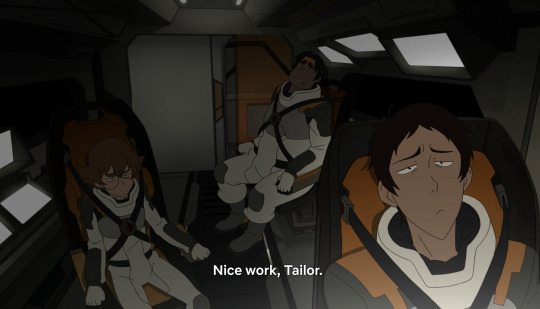
Pidge and Lance were introduced to us as the audience as part of the original trio including Hunk. It started of as a regular group of mischievous kids who just had a knack for getting into trouble. This was mostly true and upon becoming paladins of Voltron, not much changed. Pidge and Lanced dynamic started as classmates, but through their individual character developments (Lance maturing into the role of a paladin, and Pidge finally finding her family) their relationship has a large opportunity to flourish.
Starting with the first episode, Lance and Pidge didn’t have much problem with personal space, which in itself shows how easily they became friends from the get go. It is known that not a lot of time passed between the time Pidge joined the Garrison and the landing of Shiro, but yet upon seeing Pidge sneaking out Lance was immediately intrigued as to where she was going, following her rather that continuing to sneak out for some fun. Upon finding her, Lance is quickly intrigued by her set up and her ability to pick up alien signals. It’s no secret that Pidge is impressed by her own work, but for a non-science man like Lance to be even remotely interested is a feat she is very easily pleased by. Once in space, they continue to bond in ways similar to the rest of the team and there relationship becomes stagnant and very casual. The perfect base for a deeper connection.
Show Evidence
Protectiveness
Pidge and Lance are both characters who throughout the show grow to become protective of their teammates and friends, but there is evidence of their sacrifices for each other specifically. Their actions in the following scenes are the most pivotal plance moments and therefore I’ll go through each one individually. The first instance is the first Sendak attack.
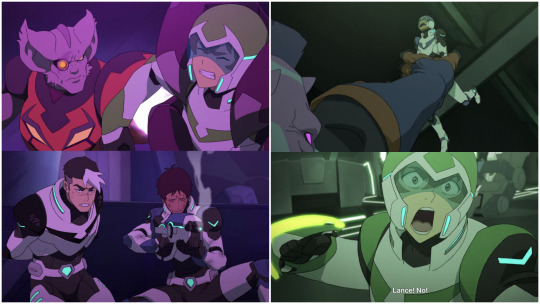
Upon Pidge’s capture, while Keith and Allura do make moves to take her back, the first move is made by Lance.While this doesn't seem like it would be much different from any one of them rescuing Pidge from Sendak, it is to be noted that prior to, and then immediately afterward, Lance was in critical condition and unconscious.
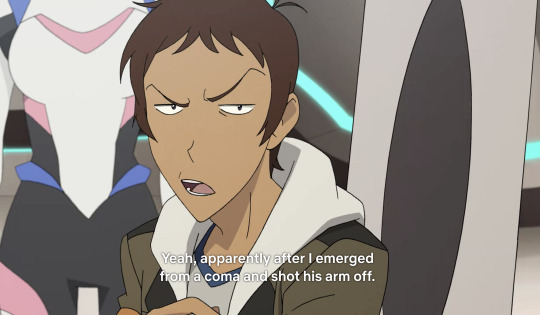
He uses the word “apparently” inferring that he does not remember the event and that it was a completely unconscious (literally) decision. What are the chances that the writers would have Lance be the one to rescue Pidge rather than any of the other equally as abled, not to mention conscious and ready for battle, characters?
This moment is almost exactly paralleled in the episode Escape from Beta Traz. She is not as successful, but her intent and persistence is there, as she goes in again for a couple more attacks. This is the first time we’ve seen Pidge enraged, with the exception of anything relating to her family being found.
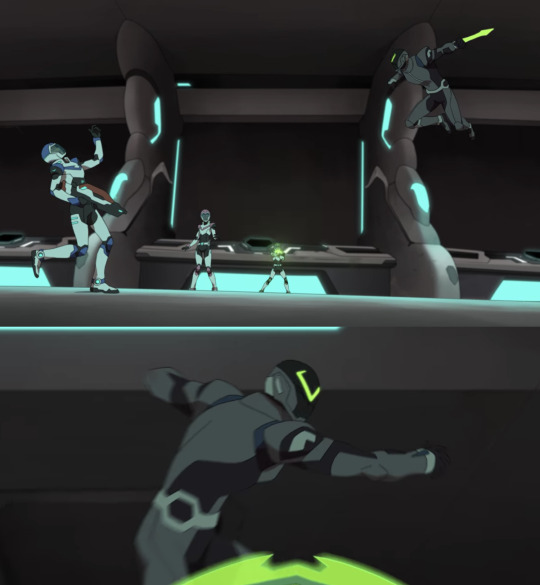
In the alternate reality episode, when the team first encounters Sven and Slav, Pidge’s rescue is a scene done entirely in slow motion. Why would the staff have any reason to have the shooting of Pidge’s attack be in slow motion, rather than the actual reveal of Sven/Shiro? To showcase the fact that it was Pidge and not Allura who was directly next to her, with a similarly ranged bayard, taking the shot to save Lance.
We cannot continue without the mention of everyone’s favorite season seven plance moment, the “Don’t you touch her!” moment. This moment of Lance’s protective nature is very different from his usual, and it is an important scene for all future planned development.
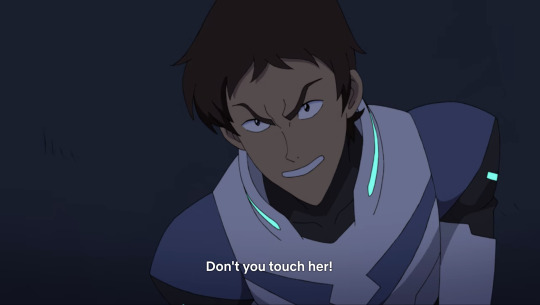
The writers chose the phrase “this group of heroes has a soft spot for the small one” specifically for Zethrid, implying that she was hoping to torture the entire team at once. What we got instead, was Lance’s surprising lash out, cutting away from the team to protect Pidge. Lance, having gone through a lot of character growth and maturing, is a very rational and accepting of fate person. He has had many instances where he sacrifices himself for the good of the team, but what sets this moment apart from the rest is his obvious anger. When Lance runs into the face of danger for someone else, he does so as sacrifice, taking the hit to save another, but here, he does not offer himself instead. He runs full force towards Ezor, as though she had crossed some line deep seeded in Lance.
His choice of words is also very important. “Don’t you touch her!” He very well could have exclaimed “Stop!” “No!” “Pidge!” or even “Don’t hurt her!” Single word exclamations are a usual when it comes to Voltron writing, but Lance’s specific choice of the words “don’t you touch her” may reveal something deeper to his idea of Pidge, feeling he may not even be aware of. The idea of Pidge being hurt had no time to register, because his first priority is that no one even touch her.
Jealousy
There have been moments sprinkled in the show hinting to Pidge having at least some feelings of affection toward Lance, shown through the ways of jealousy.
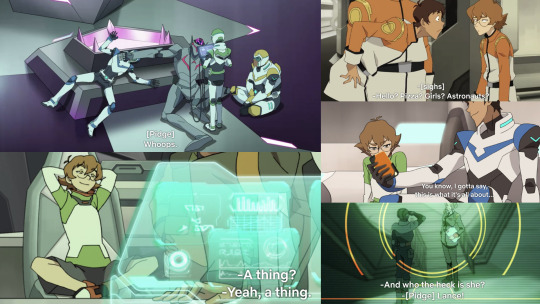
Pidge is a smart girl, who knows that the mission of saving the universe is the most important thing, even before saving her family. She knows that should anything get in the way of her doing her duty, it must be suppressed to a later time. Perhaps she does this with her feelings for Lance. From the very first episode, every time Pidge is around to hear Lance mention girls, she almost instantly reacts. Whether it be through her face, or slapping Lance, she almost always shows her discomfort. Except for when Allura had been busy with Lotor. She was specifically teasing Lance that his chances with Allura were gone, giving Lance more time to spend with her, and possibly return her feelings for him.
Noticing
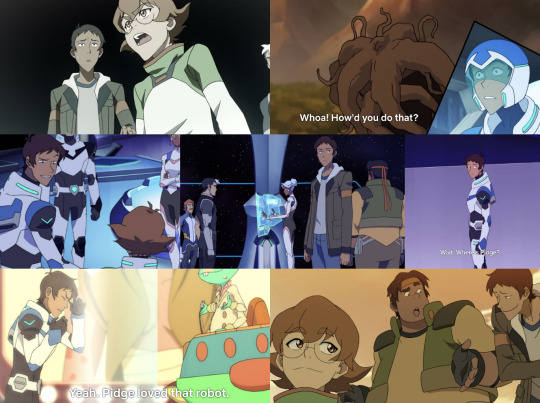
Out of all the Paladins, the one who gives Pidge the most private attention, is Lance. He has noticed her moods and reacted accordingly, even when she doesn’t seek him herself. Pidge, on the other hand, is a lot more introverted, but despite that, she still notices Lance. Based on the show’s scenes, there have been many more Lance watching Pidge scenes (like the ones pictured above). When she becomes upset, Pidge either stands her ground or isolates herself. In both instances, the scenes show that Lance is visibly upset and cares for her, but something stops him from acting. When Pidge unlocks the green lion’s vine cannon, Lance is the only member to speak out about it. In both the first season and the latest game show episode, Lance remember’s Pidge and her favorite robots, Rover and Beezer. He recalled Pidge loving Beezer more than Nyma stealing the blue lion, who at the time, he was the paladin of. He was the first out of him and Coran to notice Rover without the immediate Pidge attached to it. He even at time’s teases Pidge about all her smart talk and skills, much to her delight.
Blushing
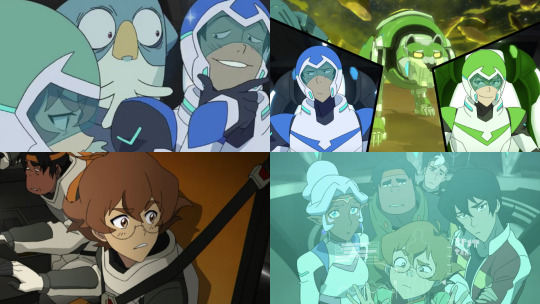
Beside the occasional tech, Lance is the only person that Pidge has blushed at. In her vlog, she states that she’s always been better with technology than other people, so connecting with a person to the point that there was an opportunity to fluster her is a feat in itself. Lance, Lover boy Lance, has blushed many times with many pretty, space girls, but the only Earth girl to make Lance blush is none other than Pidge. As it is most commonly known, blushing is almost completely involuntary. The two are some of the only ones shown to blush in the show, and that they’ve blushed at each other multiple times says something.
Final Thoughts
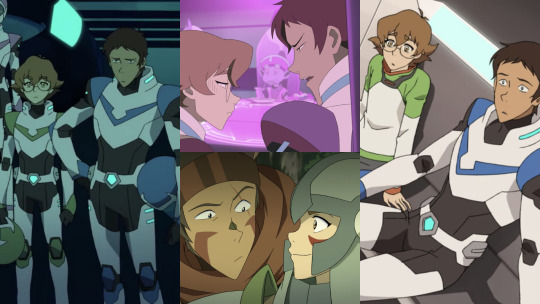
While the plance fandom started small, after the release of the recent seasons, it has grown at an impressive rate, even making the top ten on @fandom ‘s ranked ships list. There is many a theory that plance can end up canon by the end of the series. Fans and supporters of the show constantly bring up more evidence everyday and with every content. I’ll go through a few that I believe have some footing.
Speculation
In an interview long ago, Jeremy Shada (voice of Lance) opened the interview with drama of Lance dying, and later it was revealed that it did come to happen, regardless of his joking tone. In a separate interview with Shada and Bex Taylor-Klaus (voice of Pidge), he opened with Lance and Pidge falling in love followed by a “I’m just kidding.”

In the opening of season 2, Pidge is known to make trash versions of all of Team Voltron, which she takes back with her, along with the puff ball aliens. Many shots of her room and the trash versions of the paladins seem to give focus to the Lance one. At one point, it was shown in the foreground with two, a blue and a green, puffball aliens floating on him.
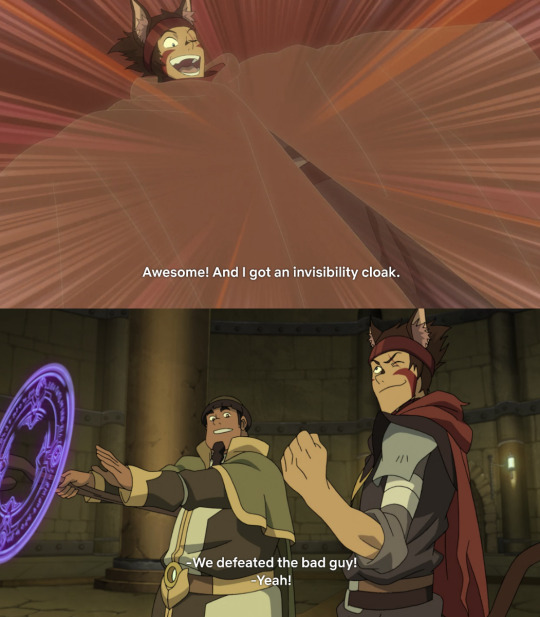
Many fans already deduced that Monsters & Mana, an episode of season six, heavily parallel and even foreshadow the series’ plot. Meklavar (Pidge) and Pike (Lance) are given similar markings on their characters. Pike is shown to gain an invisibility cloak when the team enter the room of loot. With many of the members gaining an object similar to their personalities, fans theorize that this is a nod to Pidge and the green lion’s cloaking ability.
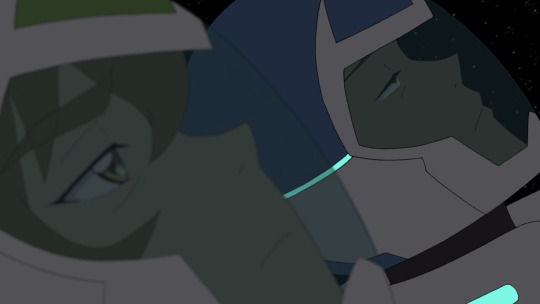
In the most recent season, the episode The Journey Within, Pidge and Lance hold on to each others left hands. Left hands are commonly associated with marriage in western cultures. In the same episode, they are shown to never switch their position implying that they’ve stayed linked almost the entire time. A fan favorite moment is when tensions were beginning to run, as the other paladins were unlinking, Pidge and Lance were the only two to remain linked.
Bex Taylor-Klaus is also a known supporter of the pairing, and being that they are the voice of Pidge makes fans go wild.

On July 2nd Taylor-Klaus tweeted a gif of Lance with the tweet being a plant emoji. Plant emoji’s are a very common motif of the plance fandom.
While many wait in anticipation for season eight at the end of this year, fans only become more anxious for any endgame relationships. Plance has a lot of potential, and it can stand on its feet with a decent amount of evidence to support it. With the end nearing, more content is created everyday with hopes, speculation, and beautiful artworks.
Pidge and Lance don’t need any romance to complete themselves, but with the terms of their relationship, being for the most part only love and understanding, plance has a chance.
What do you think will happen to plance? I would love to hear more ideas!
Have a wonderful day and thank you for your time!
#voltron#vld#voltron legendary defender#voltron analysis#plance#pidgance#romantic#pidge gunderson#katie holt#lance mcclain
197 notes
·
View notes
Text
Willing Suspension
So, six months later... *cough*
Fans have had a lot of issues with alleged inconsistencies in Sherlock Series 4--especially The Final Problem. Some I agree with, many I don’t, and others I’m undecided on or just don’t care about.
But there is one issue that, to my mind, carries more weight than any of the others.
It starts with the “missing glass” scene.

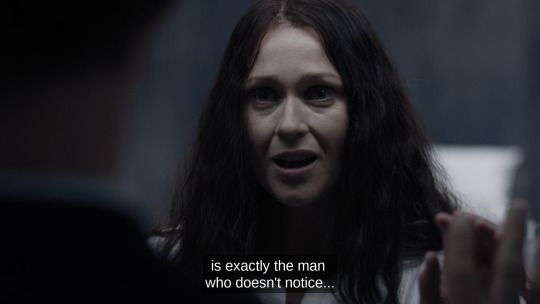




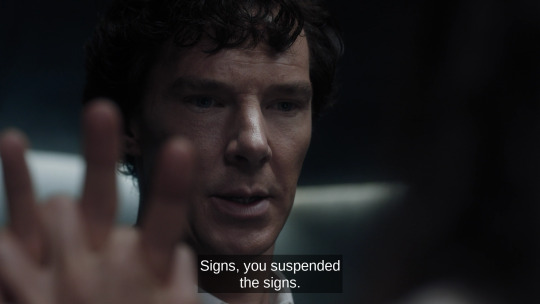

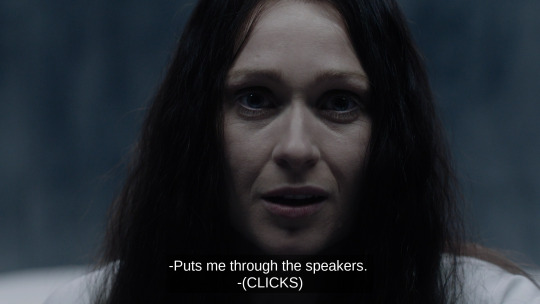


But note that I said my issue starts with this scene. It’s not the scene itself.
Sure, I know lots of people didn’t like that Sherlock Holmes, the most observant man in the world, didn’t notice there was no glass. It was even the first thing someone who’s had zero contact with fandom and had never discussed the show with me before brought up as a complaint when the episode unexpectedly came up as a conversation topic soon after it aired.
And I get why people have issues with the scene, I do.
But for me personally... meh. 🤷 I don’t mind it. The question of how Eurus had the glass taken away before her brother arrived is easily covered by the fact that she controlled the entire prison staff. And Sherlock’s writers have long since set up the idea that Sherlock gets worse at thinking when he becomes emotional, a trait that can be reasonably supported with ACD canon:
He never spoke of the softer passions, save with a gibe and a sneer. They were admirable things for the observer—excellent for drawing the veil from men's motives and actions. But for the trained reasoner to admit such intrusions into his own delicate and finely adjusted temperament was to introduce a distracting factor which might throw a doubt upon all his mental results. Grit in a sensitive instrument, or a crack in one of his own high-power lenses, would not be more disturbing than a strong emotion in a nature such as his.
Meeting your long-forgotten sister in a secret island prison counts as a situation likely to generate strong emotion, I think.
So, sure. Why not. I’ll go with it and let them off the hook regarding whether Sherlock should’ve felt Eurus’ breath, noticed the violin sound wasn’t just coming through the speakers, etc. I honestly found the no glass reveal entertaining, and it’s not as if the whole thing was impossible.
Well...
Maybe not the whole thing.
Even if I stand ready and willing to cut them all the slack in the world in terms of Sherlock having an observational breakdown, there’s still one problem.
Eurus: Do you see how it was done? I know you like explanations.
Sherlock: Signs, you suspended the signs.

There are six signs in Eurus’ cell. Each of the three big “panes of glass” has a a sign in the lower center that reads “MAINTAIN DISTANCE OF THREE FEET” and a sign in the upper right that reads “ELEPHANT GLASS / SHOCK PROOF.”
The sign layout may be slightly easier to see in this screenshot from Jim’s visit, though of course the real glass wall was still in place then:

Once the glass wall is gone, the Elephant Glass signs (and no, that’s not a real brand, and I’m still not sure why I saw people insisting it was after the episode aired) are easy to explain.

The Elephant Glass signs are suspended by attaching one end to the window frame. Easy peasy. (And probably why it’s the thing we see at the end of Sherlock’s sign deduction--that’s what sticks in your head.)
But the Maintain Distance sign?
Here’s more of what we see when Sherlock “figures it out”:
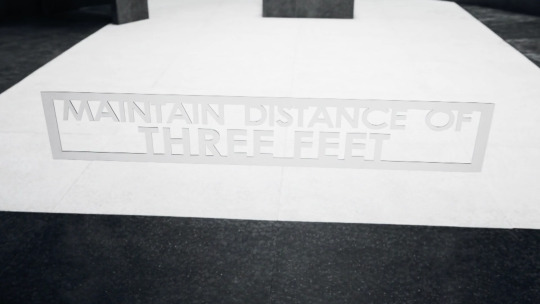
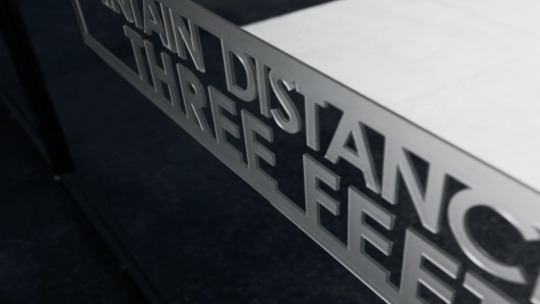
You may not have noticed because they showed it very quickly before cutting to the clearly-attached Elephant Glass sign, but this sucker isn’t “suspended” at all.
It’s just floating in mid-air.
Defying the laws of physics.
That, my friends, is impossible.
And that’s the part I have an issue with.
“Who cares? It’s just a TV show. It’s not real anyway.”
Here’s the thing.
I gladly will--and have--let all kinds of things go on this show because it is just a TV show. People who think Series 4 was the first time Sherlock has included elements that don’t make a ton of sense frankly haven’t been paying much attention.
BUT.
There’s “TV impossible,” and then there’s impossible-impossible.
To illustrate with another example from Series 4:


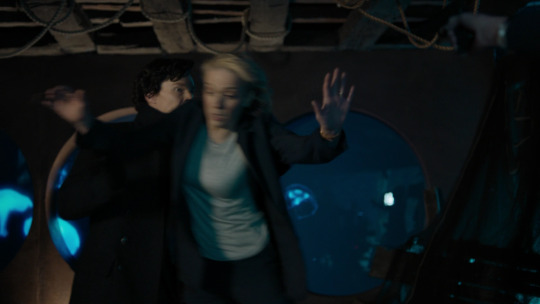
In The Six Thatchers, Mary jumped into the path of a bullet to save Sherlock.
That is not a thing. You cannot do that. It defies the laws of physics to have time to get in the way of a bullet you’ve seen fired at close range.
That said, while I have very strong opinions on what the Actual Deal With Mary’s Death was, her miracle leap has never been a thing that bothered me.
Because even though you can’t do that in real life, people do it all the damn time on TV.
So I don’t care why the writers deployed that trope. I’m willing to accept it as the trope it is and move on.
Compare that to the magical, anti-gravity sign.
There is no magical, anti-gravity sign trope that gets pulled out in detective stories (or stories about detectives, if you prefer) on a regular basis. And there’s a reason for that.
I’d like to call my next witness:
Collider: Are you surprised that people seem to always want to know about the possibility of a cross-over between Doctor Who and Sherlock?
STEVEN MOFFAT: That’s a question that I get asked so often, and I can’t keep answering it. It’s all right for Doctor Who. That’s fine. But it would change Sherlock’s life, if he met the Doctor and knew that time travel was possible. He’d have to factor that into every crime he solved.
Good answer, Steven. That is the Right Answer. Sherlock Holmes can’t meet the Doctor and go on an adventure in space and time because it would permanently alter Sherlock’s ability to do logic-based detective work.
Think about what happens to the show if we accept that Shit Can Randomly Float Now.
“But how did the robbers get twelve tons of gold out of the bank while it was surrounded by police?”
“Obvious. They levitated it through the hole they cut in the ceiling.”
“Oh, right, I keep forgetting that Shit Can Randomly Float Now.”
“You murdered your husband by cutting his parachute cords.”
“Look, I admit I cut the chute. But if he didn’t want to die he should’ve just deactivated the power of gravity before hitting the ground. I didn’t murder him--it was clearly suicide.”
“Fair enough. You’re free to go.”
“So how did someone manage to kill her in this room that was locked from the inside?”
“I dunno. Wizards, probably? Who cares. We don’t have rules anymore.”
Even if the audience is willing to handwave all kinds of cheesy tropes and plot holes because it’s TV, there is a point in a show like this where a line is crossed and logic fundamentally breaks down.
You cannae change the laws of physics. Or at least not that much.

“Okay, but is the sign really not suspended by anything?”
It’s really not.
First of all, remember that completely invisible support structures are simply a different type of impossible. So that’s out or we’d just be getting to the same problem in a different way.
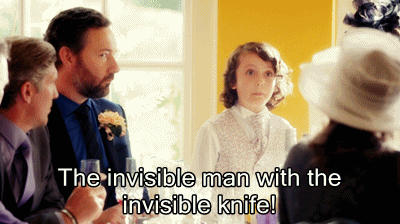
...turned out to be a visible man with a visible knife. Because things can’t be invisible according to the rules of this particular fictional universe.
Second, when Eurus leapt from her cell to attack Sherlock, we can very briefly see she knocked the sign down (bottom right):

And there’s no hint of any kind of support system going down with it.
About 30 seconds into Series 4 bonus content Behind 221B: The Final Problem, you can see them filming this moment.


And if you watch them filming the moment Eurus made her jump, it looks like Sian was basically given a loose sign to toss aside.


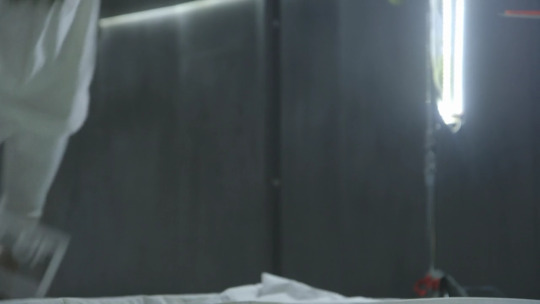

“Wait, I saw a YouTube video--”
The one where they said the floating sign was only an Indiana Jones style optical illusion? I saw that, too. But they got it wrong.
The “leap of faith” illusion in Indiana Jones and the Last Crusade (video here) relied completely on making sure the observer--Indy--stood in only one spot with only one angle of view.

If Indy had been able to move right or left from his starting position before taking the leap, the optical illusion would’ve been ruined.
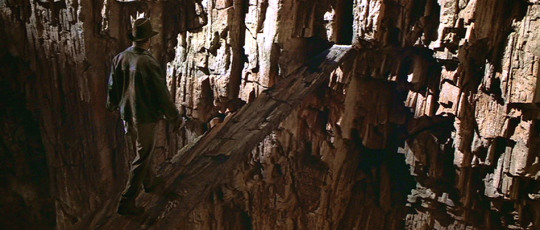
But Eurus didn’t make Sherlock stand in one place the whole time. In fact, she asked him to go all the way to the far left side of her cell to retrieve the violin. (Note the floating sign on the right edge of the image below.)

If it’d been a perspective illusion, that would’ve ruined it.
Also, all the behind the scenes & rehearsal images make it even clearer this wasn’t set up as an optical illusion / perspective trick:


The signs were all exactly where we thought they were.
Speaking of behind the scenes...
So how did they do it? If it’s impossible for signs to float in midair, how did Sherlock’s crew make it look like they were hovering?
As you can see from the images above as well as Production Designer Arwel Wyn Jones’ current Twitter header...
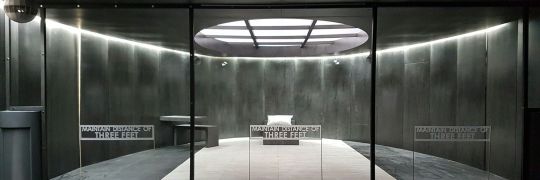
...the Maintain Distance signs were all on stands that were erased by an effects team in post-production.
(If you look closely at some of Arwel’s photos, there was also fishing line or wire being used to support the top corners of signs part of the time. Seems like that may’ve been more of a “please don’t knock our important set pieces out of place during rehearsals but we’ll take this down while we’re actually filming” measure, but if not they obviously erased it from the final footage as well.)

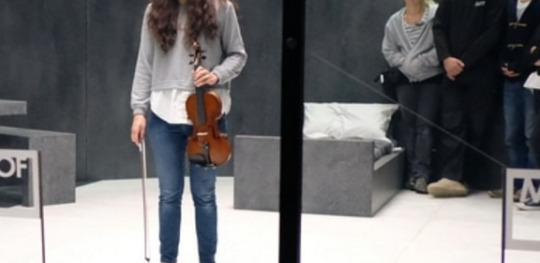
“Look, the writers are just lazy. They probably came up with an idea that sounded cool and didn’t realize it made no sense.”
Ehhhh... Even if I’m willing to entertain that notion to a certain degree, it only goes so far because of the multiple layers of people involved in planning and executing the special effect. Even simplifying quite a bit, we have to account for this making it through at least three layers.
Layer 1: The writers--both Moffat and Gatiss on this episode. Personally I think it’s unlikely they wrote this into the script with zero concept of how they wanted it to work, but sure. For the sake of argument we’ll say they just thought it would be good TV and didn’t care how it would work. But they still had to hand the script over to...
Layer 2: The production design team. Arwel and company needed to go through the script with a fine-toothed comb to work out what they needed to build and what it should look like. Did they see the part about suspended signs and decide, “Well, if the writers didn’t spell out how this works we’re going to have to assume it’s magic gravity powers”? No, of course they didn’t. For a number of reasons, not least of which being because you need to have extra budget discussions with the producers before you decide to call in...
Layer 3: The post-production effects team. They would’ve worked with the people making the set to decide how best to set things up so the support stands for the signs could be erased later. Do we really think there was no point in these discussions when one of them asked, “Okay, if we’re taking the support stands out digitally, are we adding in something to replace them? Because you know signs can’t really float, right?”
And like I said, that’s a very simplified version. In reality, there were actually way more layers of people involved. Not limited to but certainly including the dozen or so people who we know were standing by watching as these scenes were rehearsed and filmed.

You don’t need to be an expert in anything but real life to notice the problem. An intern who’s primarily in charge of coffee runs knows enough to work out the issue here and ask the question: “But how are they suspended?”
I know it’s popular to accuse Sherlock’s writers of being clueless. But even if that were true, how many other perfectly reasonable adults are you willing to say forgot that gravity exists?
The team as a whole didn’t get through making this scene without realizing what they were doing. No way.
“Maybe they just did it because they wanted the glass to be missing and there was no other way they could’ve had it happen.”
But there were other ways to handle this. Here, I’ll give you three relatively simple and low-budget alternatives right now.
Alternative 1--The Fix:
There’s something simple they could’ve done that would make the whole anti-gravity problem not exist, while still getting to do the “gasp! missing glass!” moment.

Arwel clearly thought through the design of this sign before they manufactured it. He styled it so all of the letters touch the border. If he hadn’t, we’d also need to wonder how Eurus got each individual letter to float.
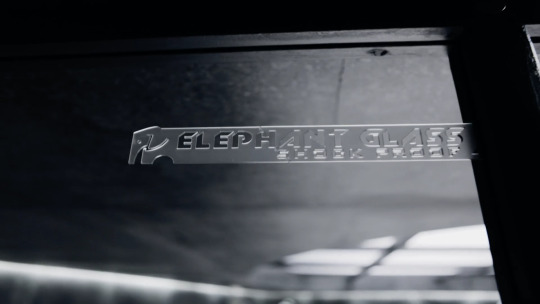
And like I said earlier, the Elephant Glass sign is a-okay. It’s attached to the window frame, so there’s nothing impossible there.
All they needed to do was combine these two approaches and they would’ve been fine.
UK safety rules require markings (“manifestations”) to be placed on glass walls so that people know there’s glass there and don’t walk right into it and hurt themselves. This usually takes the form of frosted glass dots, squares, or stripes, though more elaborate designs are also an option.
If you’ve never noticed before, now that I’ve mentioned it you’ll probably start seeing these frosted glass markings all over Sherlock. Often because they’re shooting in real-world locations that have to follow the safety rules:

But the production designers add them to sets they style or build, too, presumably for a sense of realism. For example, here’s the prison governor's office from The Final Problem:
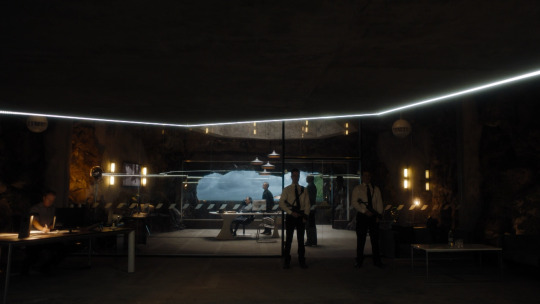
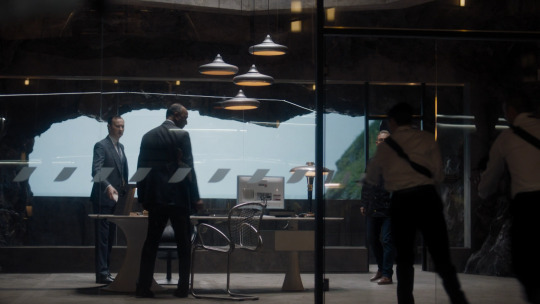
And they custom-designed the large frosted stripe we saw at St. Caedwalla’s in His Last Vow to include the hospital logo they’d invented:
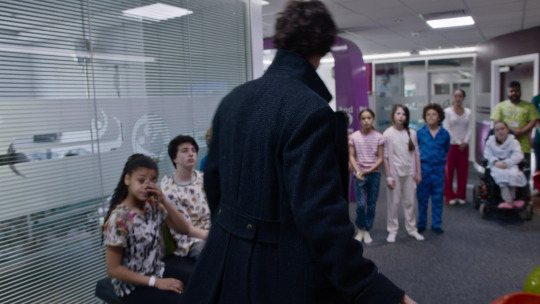

So Arwel is completely aware of the option of designing a custom glass stripe that goes from edge to edge in a window frame...
And hopefully by now you see where I’m going with this.
If they’d just treated the Maintain Distance sign more like a custom glass safety marking, they’d have no physics problem. Add some stripey extensions to the sides. Or do something more elaborate and work the prison logo into the design. It doesn’t matter, as long as all parts of the design are connected to each other and the ends of the sign connect to the sides of the window frame.
This change would have virtually no impact on the story. The only difference would be Eurus potentially knocking down a larger sign when she leapt out of the cell to attack Sherlock, but that’s only on screen for a fraction of a second as-is.
And to be totally clear before someone tries to argue the point, no, I’m not saying secret government prisons would be required to follow typical health and safety rules for their glass cell walls. I’m just saying that people are subconsciously used to those rules, and the production designers could’ve used that expectation to their advantage to design a trick that would be possible in the real world.
(Also, if anyone should appreciate the value of safety markings on glass walls, it should be Sherlock’s crew.)
Alternative 2--The Cheat:
At this point in the post, I’m sure someone is already screaming at me through the internet: “Invisible thread! Eurus used invisible thread like in a magic trick!”
If you’re not that screaming person, here’s a little background info. Invisible thread is a tool used by magicians to make small objects appear to levitate.
Invisible thread isn’t actually invisible, it’s just very thin and therefore hard to see when the lighting and background are right.
If you were trying to pull off Eurus’ trick for real, I think there would be a lot of problems with using invisible thread to suspend the signs. You’d have to not reveal the thread via the scene’s lighting changes, it would have to be equally invisible whether seen against the dark walls of the cell or Eurus’ pure white outfit, you’d probably have to construct a whole web of the stuff to support the weight of the signs, even if you got the signs to stay up it would still be hard to keep them perfectly still, etc.
So I don’t consider invisible thread an actual fix for the problem the same way as I do Alternative 1 above.
But that doesn’t mean I wouldn’t accept it as a cheat.
And it would’ve been so simple for them to do. Just show some fishing line or whatever holding the Maintain Distance sign up when you do the zoom in for the “you suspended the signs” reveal. Or even easier, show some snapped clear thread hanging off of the sign after Eurus knocks it down. Either of those could’ve been done as practical effects for pennies.
Invisible thread still wouldn’t be a great solution to the “how,” but for me it would at least be better than anti-gravity and enough to get to a point where I could say, “screw it, they tried.”
Alternative 3--The "Pay No Attention to That Man Behind the Curtain”:
Look, I’m not kidding when I say there’s a lot I can handwave and ignore.
This is the least-good alternative, but if they’d simply not gone out of their way to draw attention to this problem it would still be better than nothing.
They didn’t have to have Eurus ask if Sherlock knew how she’d done it and point out how nice explanations are. They didn’t have to include closeup shots of a very clearly un-suspended sign that blatantly contradicted Sherlock’s explanation.
Just... don’t.
Don’t do that.
Yes, it might mean not giving a firm answer to the question of “how,” but since that answer was a lie anyway who cares?
It would at least look less like they were trying to get caught. Because as it stands...
“But WHY?! Why would they do this to us?”
I feel ya.
I feel ya like whoa.
And obviously I can’t give you a definitive answer to this one, because I’m not in the showrunners’ heads.
But the thing that keeps coming back to me is a Sherlock Holmes quote. The one that may be his most famous piece of advice.
It is an old maxim of mine that when you have excluded the impossible, whatever remains, however improbable, must be the truth.
If an anti-gravity sign is impossible and can’t happen, then what remains is... it didn’t.
If the writers, FOR WHATEVER REASON, decided they wanted to end Series 4 with a wild fantasy sequence but, FOR WHATEVER REASON, didn’t want to come right out and say this is all imaginary / a dream / whatever... They’d have a problem when it was time for Series 5.
If they came back for the next episode and said “that last ending was all a dream, but we totally planned it the whole time” who would believe them? Since they had to keep most of what happened in the ending at least in the range of TV-plausible to disguise the imaginariness, it would come off as them having written a weird ending that wasn’t very well-received and trying to retcon it after the fact.
But if they slipped in one thing that’s not just improbable, not just an over-the-top version of a common unrealistic trope, something that’s straight up impossible-impossible... They could at least say, “Look at this right here. It was an anti-gravity sign. That’s clearly impossible. And we even drew attention to it with the dialogue. We did plan for this to be an imaginary sequence the whole time, and we told you but you didn’t listen.”
I mean, they’d still get yelled at.
And tons of people still wouldn’t believe them.
But it would at least be a stronger starting position when it was time to begin unraveling the fantasy.
“It doesn’t make sense, Sherlock, because it’s not real.”

“So you think all of Series 4 is fake?”
Nope.
I don’t even think the whole episode is fake.
I’m aware “everything’s fake” has emerged as the single most popular Sherlock theory post-Series 4. And, as always, I feel everyone has a right to their own fan theories. But considering it took me six months to start writing this post and over a week of barely fitting in a few moments here and there to finish it, I hope you’ll accept that lack of time is just one of several reasons I’m not really interested in debating the “everything’s fake” theory with anyone. I’ll just be over here trying to squeeze in time to write about the things I believe or think are interesting, and you do you. Cool? Cool.
Here’s where I think the borders of fakeness lie.
The events of the “missing glass” scene affect everything that comes after it, until the end of the episode. So I think Sherlock and John running out of Rathbone Place is the end border of fake. (I count the girl on the plane sequence from the start of the episode as part of this chunk, too, since it chronologically “happened” after the missing glass scene. But we know that’s fake no matter what, so hopefully I don’t have to make an argument as to why.)
To figure out where the fakeness started, I look back for the most obvious break point. Directly before the missing glass scene, we had the boys hijacking a boat and sneaking into Sherrinford. If everything that followed at Sherrinford was fake, I think those parts are probably fake as well.
Step back once more and you get... Hey, the part where John and Sherlock make it through an explosion and a leap from an upstairs floor without so much as a twisted ankle. That seems like a good break point. We’ll label that the beginning border of fake. (Which means the patience grenade detonation is where the true wait for the rest of the story began.)
Yes, weird stuff happened at Mycroft’s house before that, but nothing impossible. If Sherlock’s effects team can make paintings bleed, so can Sherlock the character.
And yes, it probably means Mycroft was at least partially lying about Sherrinford and Eurus’ backstory in 221B, but they already gave us a hint about that one.
Meanwhile, if everything from this:
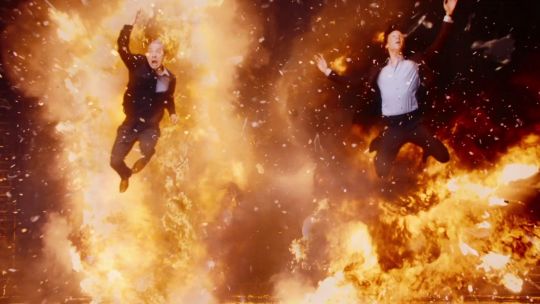
To this:

was fake, that conveniently does a lot of cleanup on some of the sketchiest parts of this episode.
No more questions about how John and Sherlock were fine after the explosion even though they totally overshot the awning Mark Gatiss later claimed they landed on. (And if they did get hurt before switching to fantasyland, that could explain the weird running hospital theme, too.) No more wondering about Eurus’ mind control, which was pushing the limits of even TV-plausible. It doesn’t matter that the method Sherlock used to solve Eurus’ song puzzle was totally borked, because it didn’t happen anyway. It’s no longer contradictory for Eurus to have sent a bomb that could’ve killed Sherlock when she was so desperate for him to survive to finish her plan later, because the second part didn’t happen. And so on.
Sure, saying this portion of Series 4 and this portion alone was fake doesn’t fix all the remaining weirdness from the previous two episodes. But in my opinion, it doesn’t need to. “Fake” isn’t the only way to fix things. I think the writers have left themselves room to clear the rest up with a combination of the audience having been presented with true-but-incomplete information along with characters lying, being tricked, or having other forms of mental lapses. (There’s a freaking memory drug in play, for goodness sake.)
[And I guess here it might be worth reminding everyone for the gazillionth time (never works) that I’m not a shipper (though I don’t care if / what others ship) so there are certain things I’m not trying to “fix” and will not be discussing in future posts. And if everyone could please hold off on asking me what I think of shippy “evidence” and/or yelling at me for making everything about my nonexistent ship, that’d be really super. Thanks.]
“But I don’t want there to have been a big fake sequence. I’d rather have the ending we got.”
Fair enough. Whether you don’t like this whole idea because it feels like a waste of time to give most of an episode over to unreality, or because you were happy with the ending (or even just some of the Sherrinford moments) we got and you don’t want that wiped away... I hear you. That’s fine with me.
And if they never make more episodes, it won’t even matter.
In the meantime, you can just think of my posts as being like someone writing an alternate universe fanfic you don’t care for and ignore it.
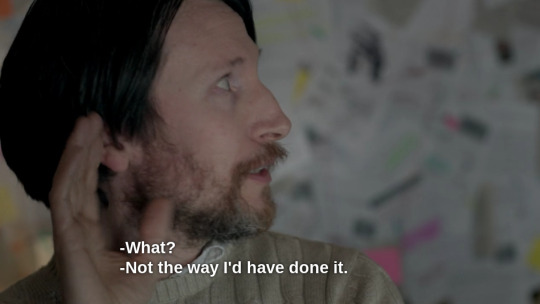
Bonus track!
There’s something else Moffat and Gatiss might--MIGHT--have snuck in to support their “of course this is fake, Shit Can’t Randomly Float Now” escape hatch.
Remember when Mycroft said this?

Eurus was “beyond Newton.”
Isaac Newton is known for doing and discovering many, many things. (Including sticking a bodkin in his eye to learn how it works, which could’ve inspired the story of young Eurus using a knife to see how her muscles worked.)
But if you had to name the thing Newton is most famous for, the thing the average person would be most likely to name if you asked what Isaac Newton discovered, it’s gotta be gravity.
The BBC iWonder page on him is even titled “Isaac Newton: The man who discovered gravity.”
He did way more than that, but it’s the shorthand most people know.
Newton = gravity.
We’re told Eurus is beyond Newton... and then when she designs her missing glass trick, she’s all

And as a possible bonus-bonus, the story about Newton discovering gravity is probably so famous because it’s been mythologized in the form of a story about Newton’s revelations being sparked when he saw an apple fall from a tree.
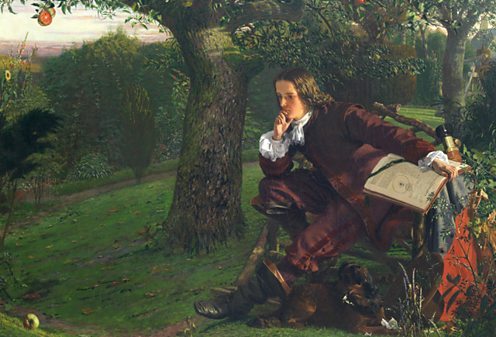
The fallen apple has become a go-to symbol for Newton’s gravity theories.
When the Royal Mail celebrated Newton on stamps, one of them was an apple.
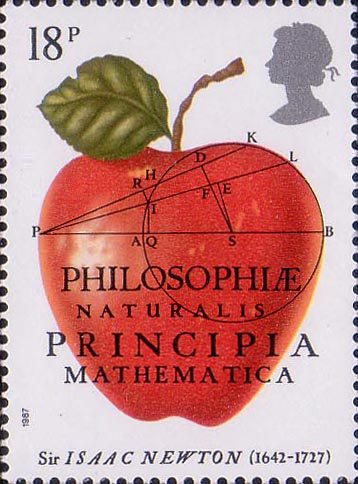
Buy an Isaac Newton bobblehead, and he’s got an apple at his feet.

You get the idea.
At the start of the episode, one of the first things that catches plane!Eurus’ attention is...
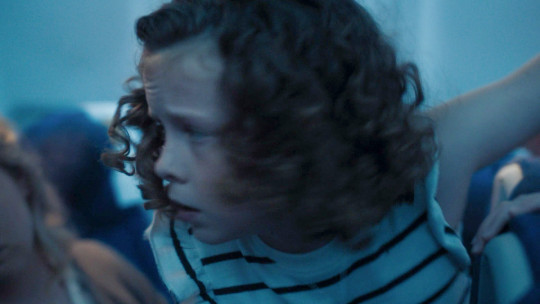


...that the flight attendant has collapsed in the aisle, and dropped several apples.
Maybe UK airlines are super into healthy snacks and give out whole apples all the time, choking hazards and leaving passengers with sticky cores to shove into seatback pockets be damned.
But I’m just saying.
[Before anyone asks: I do have many more thoughts and notes about Series 4 I’d like to write up eventually. Some of those will probably (hopefully?) clarify some topics I didn’t get into very deeply in this post. But like I posted after Series 4 aired, my new rule for myself is that I’m going to take my sweet time doing it. So it’ll happen when it happens. It is what it is.]
#sherlock#bbc sherlock#sherlock theories#eurus#sherlock holmes#mycroft holmes#john watson#sherrinford#isaac newton#steven moffat#mark gatiss#arwel wyn jones#behind the scenes#the final problem ep#long post is long#welp#this is toothpaste i'm not going to be able to put back in the tube
620 notes
·
View notes
Text
Across the universe
Will closed his eyes forcefully as he felt the structure of the castle shake violently like a leave in tempestuous weather as another blast of energy stroke against the force field that was bound to break sooner than later. He could hear the sound of the alarms echoing along the empty hallways of the palace, alerting the few beings still on board that the situation they all feared was closer to reality than a simple speculation, way that it had been presented before the relative period of peace they had been leaving shattered to no more than mere ashes, broken fragments that the blue eyed would have loved to pick up. The blond really wished things could be as easy as his mind made them sound.
He knew he had to keep himself calm, freaking out wouldn’t do any good, but it was really hard to be rational when the noise produced by multiple explosions reached his ears, a constant reminder of what was at stake and a glimpse of what could happen if anything were to go out of hands. It was anything but a nice thought, it was a dreadful scenario that shouldn’t be more than a nightmare and yet it seemed craved behind his eyelids, bloody images forever frozen in time for him to watch.
Not even in his wildest dreams had his brain been able to put together such gruesome collection of scenes like the ones that could be seen happening on the other side of the glass that separated the control room from the starry area outside. Maybe it was simply naïve thinking but the blue eyed had hope for the conflict to be finally over, for there to be peace in every single corner of the vest universe he had got to love with time. Perhaps it would have been better to be more specific with his wishes instead of just wording them mentally in the vaguest way possible.
The blond took a deep breath, considerably hot air filling his lungs to the point that he was certain he would choke on the element that was supposed to make him feel better. He had promised them that he would be strong, that no matter how hard the situation looked form his perspective, he wouldn’t let his spirit be crushed against the weight of hopelessness; said task was, in all honesty, becoming harder and harder as the anxious tics passed by.
His glance hesitantly wandered around the room for what probably was, at least, the tenth time in a row, trying his best to avoid overthinking, putting a lot of effort in stopping himself from falling into a spiral of endless panic. There was enough negativity where he stood, the people surrounding him certainly didn’t need to deal with his wild line of thoughts which apparently were trying to push his sanity to the limit.
Muffled voices started to reach his ears, the sound of violence spreading outside having finally started to dim down a little, although that did nothing but made the pitch of anxiety grow on his stomach, the uneasy sensation that slowly passed through his nerves not having apparent plans of leaving him alone any time soon.
He tried to recall how exactly had they all ended like that: horrified by other’s actions as they fought to keep a grip on themselves. His mind, however, was blank, void of everything except for the sensation of constant panic that crawled through his whole being, freezing him in place against his better judgement.
There was a time when things weren’t like that though, a gentle voice reminded the blond as he forced air into his lungs, a painful reminder that made his heart shattered under the pressure of sweet memories long lost. The thought brought cheerful images back to the surface, scenes from the past that seemed to reach for him, wanting to drag him into a bliss that would be impossible to experience in the world he was now living in.
The blue eyed nervously passed a hand through his already messy hair, his shaky fingers tangling themselves on his blond locks, twisting them lightly in partial exasperation as the pit of anxiety began growing on his guts, making him feel dizzy. He could feel the air around him becoming heavier, threatening to bring his body to the ground with help from the gravity that had been his only pillar of support besides the wall surface his skin had stopped to acknowledge.
Somehow remembering past chapters of his personal history made him feel even worse, the good feelings of yesterday were toxic, a subtle poison that changed progressively from sweet remedy to deadly venom. It sickened him, how something that used to bring him peace at night when sleep didn’t seem to have any intentions on catching up to him now just left him with an awful taste on his mouth.
The air around him suddenly changed drastically, the delicate scent of beautiful flowers whose name had slipped between his fingers invaded his lungs, his heartbeat reluctantly going back to a much more slower pace as lines started to get drawn across the blank canvas of his mind.
Lilac petals hovered above his head, dancing freely without a care in the world, the hills with lively greenish grass as their stage a couple of more daring ones brushing his blond hair, leading to the corners of his lips tugging up slightly. Spring had always been his favorite season as far as he could remember, everything around him seemed to born again at that time of the year: the imposing trees stopped being void of company, leaves colored by a cheerful nature went back together to make each other company once more, new flowers bloomed proudly where others had saved a spot, the luminescent rays of the stars above shone elegantly as a warm welcome.
On some very rare days, when he was free of responsibilities and had a friendly hand that was willing to tag along on his adventures, he would sit down under that magnificent tree he had seen grow and taken care of for the last couple of years, the one his mother had looked after since it was nothing more than a frightened little seed. It had grown so much since the first time he had seen it with his own eyes: its branches were no longer scrawny to the point that Will had imagined them all breaking in half if the wind showed no mercy, it looked less than a reanimated object as a certain shade of dark brown stopped being the predominant color, soon being replaced by a joyful green which was later on joined by a vivid purplish-red color displayed by the small flowers that seemed attracted to the few visible roots.
The blue eyed would rest his head against the hard surface of the overgrown plant, closing his eyes as the giant body of leaves projected a large shadow above him, covering him like a silent blanket. His mind quickly traveled to the distant figure of his mother in moments of quiet like those, he wondered if she would be proud of what she had contributed to construct, of the individual she had put a lot of effort into raising.
Sometimes, if the fates were in a nice mood and decided to behave favorably towards him, the feeling of loneliness he tried so hard to keep buried inside his being wouldn’t be a weight he had to carry on his own. He particularly enjoyed those moments where he could sense the familiar embrace that held him safe and warm, gesture that in certain occasions could resemble the ones he knew would never come back.
It was nice, however, getting a reminder that he wasn’t truly alone, point that hit the blond with more force as well as determination whenever his siblings were around to spend some of their free time with him. Of course that didn’t help the sentiment of guilt that appeared at times within himself go away as he thought of all the things the pair could be doing instead of wasting his time on their older brother.
Will appreciated the gesture anyway. He loved the fact that the two of them had found an empty space on their busy schedule to be with him once again, a throwback to those sleepless nights he experienced with more frequency as a child when at least one of his favorite persons in the world would sit down next to him as they talked about all the possible adventures the blue eyed could be part of, themselves always included in the tale, except that those fictional scenarios that had been spoken long ago was now a reality for the pair. Knowing other individuals that, even though had different appearance from theirs as a whole, shared similar dreams and wishes was now part of his brothers reality, had been for a couple of years, and he would be lying if he said he wasn’t happy nor proud of them: they had the courage the blond was almost certain had skipped his genetic code.
Another loud noise brought him back to reality, his glance momentarily fixing its attention on the multiple explosions that tinted the sky with violent colorations of red and yellowish shades. They were almost hypnotizing, the way gray smoke twirled in forced delight as neon lasers announced their way, pushing aside in a harsh manner whatever object in between their body and their final destination. The spectacle was definitely breath taking, but for all the wrong reasons.
Will forced himself to look away, he knew that if he continued to stare he would lose it, he wasn’t about to break the last promise he made before hell got loose before his eyes. The blond could still hear his brother’s, Michael, voice loud and clear, telling him to be strong while he placed a reassuring hand on his shoulder, his thumb gently rubbing his skin in a soothing manner as a soft smile adorned his features, those that seemed mostly reserved to the blond, before he pulled away.
His brown irises met his own blue ones briefly for the last time before the dark haired was no longer in sight, a flash of red running through the halls alongside with a taller guy wearing a blackish armor of similar style to the attire that was covering the other’s body being the only trace left on Will’s memory that the moment was not simply the product of his imagination.
The blond bitted the inside of his cheek, shaking his head in a rather violent way as he felt his eyes starting to sting as if invisible needles had started to crack the area surrounding the marks of greenish coloration framing his bottom eyelids on each side of his face. The words pronounced on their short goodbye seemed meaningless as the time flew by without any positive light bathing the situation they were all facing.
The sound of an explosion made him wince, the thin hairs on the back of his neck bristling at the unexpected event, although he assumed he should have gotten used to those by now. Part of him wished he was out there as well, in a ship with his siblings, protecting the place he called home, the people who, like him, were worried about not being able to see the following day. Will doubted his contribution would be worth anything though, he was no fighter, he hadn’t been made for that kind of activities.
It could be worse, he told himself before quickly discarding the thought. It was better not tempting the odds with words like those, they apparently took them as a personal challenge, one would have guessed he already knew better based on previous experiences.
Soft mumbles could be heard not so far away from him, loud enough to draw his attention towards the source of the sound, his glance stopping on three individuals not so far away from him whose levels of interaction had different variations on each case, both of them being the ones he held closer to his heart. At least you are not alone.
The trio of different appearance seemed focused on their own world, furious mumbles and incomprehensible whispers getting to his ears in a weird mix of voices and tonalities. Their expressions were in a constant state of change, their hands moving frantically as, he could only assume, each one pronounced their own position on a certain matter, one that apparently they were more than just passionate about.
The blue eyed hesitantly took a couple of silent steps closer to the individuals, although the new proximity still wasn’t enough to properly make up the words. His legs lead him a little closer, trying to ignore the sinking feeling settling on his stomach as the air around him became even denser and hard to shallow. He doubted he could continue to function in those conditions.
The sun kissed features of his father, framed by almost golden locks which made his hair feel like a mere copy that failed to capture most of the characteristics that defined the original, was one of the first things he was able to fully focus on despite the great disturbance happening outside the giant fortress that had been his home since he was nothing more than just a child who had just started to open his eyes to the world. Of course, moving there would imply the older blond to not spend a lot of time with his offspring, his younger would realize that reality later on.
Perhaps he could never said he would be holding the best paternal figure of the year award anytime soon, but Will would have to admit that, even though his work as royal advisor, the surprise of being told what the other did on a daily basis hadn’t worn off completely, didn’t let a lot of free time for their already somehow broken family, without it he wouldn’t have been able to meet and properly get to know one of his closest friends: the young girl with bright kaleidoscopic eyes who seemed both distressed and furious about the words that were coming out of the mouths of the two adults.
He had found her one day sitting down at the edge of a balcony as he wandered around the magnificent halls of the palace, his young mind thinking about all the possible adventures he could have in all the multiple rooms he had seen as well as in all the ones he had yet to discover. Their talk, even though it was brief compared to the conversations he used to have with his siblings when they were around, pleasantly left a mark in each one of them, they both appreciated the company they felt they were lacking of.
The meetings held between the two continued through the years, seeing each other grow as well as their peculiar friendship which only got stronger as tragedy stroke as quick as a lightning. They have both bonded over the fact that their mothers wouldn’t be around anymore, as morbid at it may sound, especially when that topic of conversation was born in the mind of a kid who should be thinking about cheerful scenes.
Everything around him seemed fine, at least as alright as a situation playing in front of his stare would allow, until, to his horror, the girl of brown locks started to slump towards the ground, only to be quickly grabbed by the black haired man nearby, her father, before she got to close to the ground.
His blue eyes widened in panic as he felt himself desperately launch forward, his irises unable to unglue themselves from unconscious figure that was being held tightly not so far away from him, the delicate movement of her chest being the only sign that showed that things could have gone worse. The sound of his steps made his father turn around, his expression reflecting something that he could only identify as pity.
“Pipes!” The blond called out, worry more than evident on his voice. He tried to get closer to the other but he found out that both of his arms were being held tightly, preventing him from moving forward.
“Will, calm down.” He recognized the voice of his father speaking softly, thing that did anything but calm him down. The tone of his voice made him sick, fire quickly spreading through every nerve of his body as the words echoed inside his head. How was he supposed to be calm in a moment like that? The whole situation was all wrong and there were people demanding him to just be alright with it? The mere suggestion angered him.
“Let me go!” He struggled to break free of the grip, which only made the later to grow in strength, making it clear that his order would be ignored due to external reasons that weren’t yet quite clear.
“I’m afraid I can’t do that.” His father said, resignation running deep into his statement.
But of course you can, he wanted to shoot back but he honestly doubt his words would have any effect on the older being, who seemed really fixed on his task. He felt a shiver pass though his spine as he closed his eyes forcefully, trying to focus on his breathing more than in the noises that had started to sound loudly once more, making it hard for him to think.
“Stop fighting, I’m only trying to help.” He heard the older blond whisper. For a small fraction of time, it reminded him of the time prior to all this mess, those nights when sometimes he would talk to a smaller version of him that was drifting between sleep and awake, when the other would say sweet words to him along with his mother as the later delicately passed her fingers through his messy blond locks
Will shook his head, pushing the memory away, a broken whimper leaving his lips as the anger left his body, soon replaced by the sinking feeling of desperation that came with the bargaining step of the staircase that tried to make sense of the thoughts passing wildly through somebody’s head when they try to come to terms with the inevitable.
“Let me go to her! I want to… I have to know if she’s alright.” The blue eyed let out as he sloppily tried to get rid of the only thing that was holding him down, not really caring about anything else at the time other than being able to see the state of the one of the only few people he truly cared about.
Suddenly, he felt the restrains lose some of the force previously applied. That was it, his chance. The blond didn’t manage to get free though since, as soon as he came up with a considerably realistic idea, an unexpected wave of pain made his mind go blank, his muscles relaxing against his better judgement, his arms and legs going limb despite his own commands.
“I’m so sorry, William.” His ears managed to catch faintly before he found himself falling to the ground, the gravity attracting him towards the floor as dead weight. It didn’t take long for the darkness to engulf him, clamming him as a part of its realm, embracing him tightly as the warmth sensation surrounding his body slowly left him on his own.
0 notes
Text
INTERVIEW: Stephanie Han
Navigating Place and Identity
in Swimming in Hong Kong
Though your language, your passport, your husband, your education and everything about you says you should feel at ease in this room, you don’t. You take no pleasure in Hong Kong trailblazing. You were not an American trailblazer. You did not invent the nectarine, win an Olympic gold medal, star in a TV show, or lead Japanese American troops into battle. You hate the phrases ‘overcoming odds’, ‘defying stereotypes’ and ‘getting ahead.’ You don’t like the words ‘assimilation’, ‘model minority’ and ‘well-adjusted.’ This is why you left the U.S..
(from "Invisible")
Stephanie Han, whose collection of short stories Swimming in Hong Kong came out early this year, gestures with her hands as she explains that while some writers save rejection letters, hers could fill filing cabinets. The gestures convey the cabinets would be the large ones, probably four-drawer and tall.
She began writing the stories for this collection twenty years ago, yet if it weren’t for the years “1982,” “1985,” and “1977” given in some chapter titles, it would be easy to assume the stories are set in present-day. And this was one of the hurdles to publishing that Han faced. “A lot of the things in the collection now are current – that’s why it’s published now,” she assessed during our talk. “Although these relationships have occurred throughout time.”
Swimming in Hong Kong is centered on female protagonists, most of Korean descent or from Korea, and is set in Hong Kong, Korea, and the United States. The book speaks with a multiplicity of voices: a Korean-American girl spending the summer with relatives in Seoul; a Korean-American college student navigating identity, feminism, and consent in New York; a little girl, who is Chinese, observing how her father is treated by white expatriates in Hong Kong during the World Cup… The stories take the complicated issues of hyphenated identities, diaspora, power, colonialism, visibility versus invisibility, race, class, gender relations, and make them personal. Swimming in Hong Kong was a finalist for the Association of Writers and Writing Programs’ Grace Paley Prize for Short Fiction as well as the Spokane Prize. The stories’ voices speak with immediacy, and the narratives pursue social issues that are layered and complex.
Han was born in St. Louis, Missouri, and has lived in the United States, Hong Kong, and Korea. Her father, who was born in Seoul, was drafted as a U.S. military doctor, and her family moved every year until she was eight or nine, when they settled in Iowa. She spent the summers of her childhood staying in a cottage at the Korean Care Home on Liliha Street in Hawai‘i, where her grandmother was the nursing home director. Most of her adult life has been in California. Han earned her MA from San Francisco State University, MFA from the University of Arizona, and was the first to earn a Ph.D. in English literature from the City University of Hong Kong. She and her husband were part of the dotcom boom and bust – and when it busted, they moved to Hong Kong for better opportunities. After years of living and working in Hong Kong, she and her husband have moved to Hawai‘i; she says that now, she would like to be in the West.
We met in a little coffee shop in Waikiki, around the corner from the apartment where she and her family live. As we sit across from each other drinking coffee and talking, I switch from typing her responses to writing because I think maybe I can write faster. I don’t. Stephanie talks quickly during our conversation, strings thoughts together between brief silences.
Brooke Jones: Why do you want to be in the United States now?
Stephanie Han: I want my son to have an American identity. My husband is British, and expat, and because I’ve moved so much, I’m constantly in the position of being an outsider. And in 2047, mainland China is taking over in Hong Kong. The rule of law will not be in Hong Kong then, and it’s slowly being infringed on now; Hong Kong is not doing well with the Beijing government. So I wanted to leave Hong Kong.
Despite what is happening in the United States, there is a way to remake an American identity. There is potential here, and an energy here. We are still a young nation, if you look at the trajectory of history – it is always four steps forward, three steps back. We are now in a backward stage. But it doesn’t make me think it is hopeless here forever. Americans can be very open people; I’m talking in very broad terms about Americans, but we are a young nation. We are also a nation that claims genocide, slavery, and massive inequality as part of its history. The American project has a lot of problems, and there are also a lot of good things that have come from this national project. It is easy for people to condemn, but I think that the very concept of nation also offers us some interesting possibilities, a way of restructuring and choosing who we want to be. That said, there are 320 million people here, so it is difficult for all of us to be on the same page at any given time. And too, why should we be beyond the basics – which I suppose is really the question. What are the minimal requirements that we expect as citizens? I wanted my son to be a part of it. And I think I can make a greater contribution as a citizen, or negotiate better from my in-between context, here.
BJ: The stories in Swimming in Hong Kong include themes of identity and development of identity, insider vs. outsider, visibility and invisibility, and place and belonging. How did these themes develop?
SH: I wrote the book from 1997 to 2004 or 2005. I did live in Korea for a year as a child. My dad was a naturalized U.S. citizen. My question had a lot to do with place – what does it mean to have a home? Asians don’t have a binding narrative. If you’re Native American you have a narrative with genocide, Hispanic with language… Asians are not like that – they do not share a language, culture, anything. As a result, we come into this Asian-American identity. And it’s very problematic. It’s an artificial construct. I think while I was writing during that time, I was trying to figure out what it meant to be an outsider and insider. I don’t write like that anymore; I’m okay hovering, not in any place. I’ve finally resolved that, more or less, Hawai‘i is both a physical place and memory to me, and the closest I have to a home.
My peripatetic existence was amplified by marrying an expat. I feel, however, it’s important to have a home and place to feel rooted – especially for our child. It would be nice to stay in one place. I’m sick and tired of buying the same thing from IKEA – you’re not going to take a knife block between countries. You can look at moving as exciting or dynamic, or even as an incredible waste of money and time. It all depends on how you prioritize movement and place. I’d be fine being in one place for a while, but I’m never going to say I’m going to be in a place permanently. It’s like a jinx. Now it’s normal for me to be outside the conversation of where I am, on the borders or periphery.
The big theme in the story collection is place. My father was a medical doctor. After he got his U.S. green card, he got drafted. Because they were drafting medical doctors up to age thirty-five, we moved a lot when I was a kid because he was in active duty. I was a military brat. We lived on the base in San Francisco and in Korea. I asked my mom, “Mom, where am I from?” and she answered, “Well, why don’t you list the places you’re from and ask people to pick a place?” That’s why I read. Reading offered me a world. My 70s mom was not big on the touchy-feely sort of discussions of how one tries to belong and was quite casual. It was a different way of parenting. She said, if you like to read – yeah, you can have a friend in a book.
BJ: Did you have any siblings? Sometimes that can help, give you someone to play with, sometimes not…
SH: I have two younger sisters. We were close as a family because we had to move around a lot. Then we lived in Iowa for a period of time, seven years. I was thirteen years old when I went to boarding school; I didn’t want to live in Iowa. The summer when I was twelve, I went to Korea, like the short story [from Swimming in Hong Kong, “My Friend Faith, 1977”]. My grandfather sent a plane ticket, like the story. That really changed my life, going there. After I came back, I decided I wanted to leave Iowa. I didn’t want to be the only Asian. There was one black kid in school, one other Asian kid. Then they moved.
While I was visiting Korea, I spent two weeks in a bizarre camp. You’d wake up every morning to the national anthem. Brain-washing. You had to promise to visit the Motherland, to build up resources. They took us to the border to see North Korea – to see that we were under threat. We had to get lectures on the military capacity of Korea, on the agricultural industry. We had to wear these badges and sit in these steel chairs and watch. Eventually they had to stop the camp – I think it became hard to control because there was a conflict between the Western teenage Koreans and the conservative Korean camp leaders. But this was a very early government attempt to engage overseas Koreans with education to come back and return to the motherland.
Seeing other Asian faces was a revolution for me, that’s what led me to leave Iowa.
BJ: Why did your parents or relatives decide to send you to that camp?
SH: My uncle heard about this great Korean overseas camp, and I went for a couple weeks. I loved it. I had pen pals after that. I met Koreans from Queens, New York , and they’d tell me, yes there are other Koreans here. But obviously the experience was so significant to me because I was culturally and socially isolated.
BJ: Often, fiction is autobiographically inspired…
SH: It can be, but it’s not [autobiographically inspired] for me. I use it as a jumping-off point. When I was in Korea and Hong Kong, I had African-American friends and heard about their negotiation of the place. I’m not one of those people yearning for my homeland. Korea has a lot of problems. It’s very racist. I’m not happy in a society where people are racist against black people or anyone who is non-Korean, for that matter. That thinking deeply bothers me. So I can’t get caught up in the “my homeland’ stuff and feel sentimental about Korea in that way as I am too critical and disturbed by this type of thinking. I’m glad I went back to Korea; it resolved issues. A part of me belongs there, and a big part doesn’t. It’s too intolerant. I can’t negotiate out of it completely because I am Asian, so when I am there, I am subject to a different level of scrutiny and ideology. A lot of people who aren’t Asian are never accepted anyway, so they can negotiate out of it. I can’t. It’s hard. I don’t have legal standing in Hong Kong or Korea, so it’s hard for me to advocate for other people’s civil liberties as I have no voting rights there. That’s part of the reason I came back, too – I want to participate as a citizen. I want to raise my voice. There’s a lot of people who don’t care about that. I can understand that, too. But I’m too invested in the potential of what can be. I want things to get better.
BJ: The first story you wrote in the collection was “The Body Politic, 1982.” Did you begin with the idea that you were writing a collection of short stories? How did the collection develop? What was the process?
SH: It was hell. Each story was rejected one hundred times easily. I was picked up by agents and dropped. No Asian-Americans would publish me. I quit taking it personally - what’s another rejection? Who cares? People save rejection letters; mine would be in the pounds. But I get enough encouragement to keep writing, but I’m probably a masochist. You see narratives like what I was writing now, but not fifteen years ago.
“The Body Politic” developed, shifted, was workshopped many times. It was the last story to be published. I think because it was the nature of that narrative: what is consent; feminism. It’s not that it didn’t exist, but it’s far more mainstream now. The people who didn’t like it and reacted poorly were Asian women. Because people want to read literature with heroes and heroines that are lovable, defy all odds. You want the Amy Tan character. Americans want to read about winners. One woman told me, I want her to stand up and punch him. It makes people feel uncomfortable when a character isn’t lovable or heroic.
I’m more interested in imparting the narratives of women because our stories aren’t told as frequently as male POVs. We’re not represented at the same level in literature. We don’t appear in publishing, government, business, areas across the board – we are still under-represented. I see narratives of women as more urgent.
BJ: How did you find motivation to continue to write and submit in the face of so many rejections?
SH: I taught quite a bit and students have a way of inspiring you and encouraging you to keep going. I also had enough encouragement to keep plodding along. Writing is also how I express myself, so it isn't as if I could simply stop as I needed to communicate and obviously felt that there was someone on the other end who might want to read what I wrote, or share my outlook or perspective.
BJ: All the stories feel very current. If the dates weren’t in some of the titles, I would have thought they were set today.
SH: That’s actually why I put the dates on them. I wanted to show that the questions are questions that have always been there, that some of these ideas we think are new are really not new, but we are now more comfortable discussing them.
In the class I teach at Hawai‘i Pacific University, the students are about eighteen. Some female students said razors don’t get a luxury tax, but tampons, etc., do. I’ve been teaching long enough that I know teenagers in freshman composition wouldn’t raise this question fifteen years ago. We’re talking about it now. It’s great.
After one hundred and fifty tries, it [“The Body Politic, 1982”] finally got published. It got published after the book was released. I am so glad. It was the story that people felt hostile about.
BJ: What were your goals for the collection?
SH: I just wanted it to be published.
I think about experimentation with different kinds of voices. There are quite a few coming-of-age stories. There’s an arc to that – moments of awakening, of urgency.
BJ: There are many voices in the stories, including child POVs.
SH: I didn’t set out deliberately to write from the point of view of a young girl [in the story “Hong Kong Rebound”]. It was for a contest. In 2002, I was in Hong Kong during the world cup. Half the games were in Korea and half were in Japan. It was an exciting time to be in Hong Kong. People would stop in the middle of the street to watch; it was just a time of a lot of energy. The South China Morning Post had a call for a story, and the prompt was “Rebound.”
My father was staying with me. I thought a lot about father-daughter relationships. He was a very devoted father when I was a young child; he’d often take me to the zoo, spend time with me. I was very lucky.
The story Hong Kong Rebound was written in 2002 and this was only five years after the Handover. Mostly there were expats in the Central bars. Locals were looking in at the bars but couldn’t afford beers that cost eight dollars. People in the bars would put up black paper in the windows. I witnessed this several times. I remember an old man peeking in one corner, where there was a little scrap of window that wasn’t covered.
So these were the three things that prompted the story. And I thought, I’m going to write something. The story won the award. Sometimes, giving yourself parameters and boundaries is good, versus if everything is open and without any rules. It had to be under 2500 words.
The swimming pool that Ruth and Froggy swim in [from the story “Swimming in Hong Kong,” also the book title] is covered now. I used to swim there. The roof was open, so you could see the sky. They decided to cover it years later. I got so mad, I wrote into the newspaper and cited facts about heated swimming pools and what have you. I got really irate about it. But they covered the pool, which is really too bad. Hong Kong doesn’t have good urban planning and has a limited understanding of design in terms of allowing people to interact with nature. On the other hand, everyone has health insurance. No place is perfect.
So the Hong Kong stories I wrote – I think they cover different aspects of Hong Kong life.
BJ: Could you tell us more about setting boundaries and parameters in writing? For instance, do you generally find parameters and boundaries helpful when you write? Do you set them for yourself? What does that process look like?
SH: Sometimes I find that having little rules can work in terms of helping you reign in your ideas. If you say to yourself I want to write a 2000-word story, you can then easily eliminate the excess, and try to think of situations that will be well told in 2000 words. Sometimes journals have requirements. Often this is a way to force yourself into flexing your writing muscles. I sometimes set artificial deadlines for myself too – I must finish X by Y date. Really, no one is asking for it by Y, but setting up that date provides you with some sort of endpoint.
BJ: You’ve written about writing into conflict and paradox. What’s your process? Do you experience any surprises while writing?
SH: It works better for me to write into conflict and paradox. We think we are one thing, but we are this other thing. Humanity by its very nature is paradoxical and contrary. I always tell my students to write into the conflict. Start right before the problem explodes, because you can always backtrack a little.
Usually, I have an idea – that there’s a problem and a moment of grace about the problem. And I thicken the story as I go along. As you’re writing, things become more serendipitous.
BJ: Could you share a bit about teaching writing…
SH: I teach at HPU, and I started a workshop series this fall. I used to teach creative writing workshops in Hong Kong. I like this idea of people feeling they can control their narrative. People have a narrative; we all have stories inside of us. The art of autobiography, it’s very much an American phenomenon. Autobiography opens our nation – there’s more texture, we have a more porous surface, hearing these voices. I feel it’s important for people to write their own story.
These people who wax poetic about the writing life – I’m not one of those people. Sometimes I think, I should do something else. But I can’t think what else I would do. Writing is a compulsion. I’m a really terrible advocate for the writing life. It’s not the only way to have a meaningful creative life. I think what is important is understanding the power of your own narrative and your community’s narrative, and having or acquiring the skill to act as a citizen in terms of being able to write to communicate about a particular problem or idea. But I don’t think writing is the only means to a creative life. You must think of how you would like to communicate with the world—some do it through music, others through design, still others through physical gestures. Creativity takes many forms.
0 notes